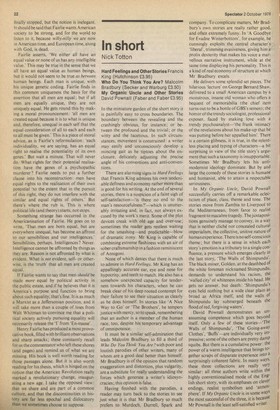In short
Nick Totton
Hard Feelings and Other Stories Francis King (Hutchinson £3.95) Who Do You Think You Are? Malcolm Bradbury (Secker and Warburg £3.50) My Organic Uncle and Other Stories David Pownall (Faber and Faber £3.95) In the miniature garden of the short story it is painfully easy to cross boundaries. The boundary between the revealing and the crashingly obvious, for instance; or between the profound and the trivial; or the witty and the facetious. In such circumstances, movement is constrained: a writer may easily and unconsciously develop a mincing gait as he tiptoes about the enclosure, delicately adjusting the precise angle of his conventions and anti-conventions.
There are alarming signs in Hard Feelings that Francis King admires his own undeniable deftness and economy rather more than is good for his writing. At the end of several stories, there is a suspicion of a faint sigh of self-satisfaction—is there no end to the man's resourcefulness ?'—which is unutterably irritating and, in fact, not always excused by the work's merit. Some of the plot devices creak with old age and over-use; sometimes the reader gets restless waiting for the smashing—and predictable—blow of dramatic irony. Mr King is capable of combining extreme flashiness with an air of sober craftsmanship in a fashion reminiscent of Annigoni.
None of which denies that there is much to admire in Hard Feelings. Mr King has an appallingly accurate ear, eye and nose for hypocrisy, and teeth to match. He also has a somehow unexpected capacity for tenderness towards his characters, when he can break clear of his deep rooted contempt for their failure to see their situation as clearly as he does himself. In stories like 'A Nice Way to Go' or 'The Brothers', he tempers justice with mercy, so to speak, remembering that an author is a member of the human race, too, despite his temporary advantage of omnipotence.
It must be a similar self-admiration that leads Malcolm Bradbury to fill a third of Who Do You Think You Are ?with poor and loutish parodies of other writers, many of whom are a good deal better than himself. Mr Bradbury is of the opinion that random exaggeration and distortion, plus vulgarity, are a substitute for really understanding the forces which generate a writer's idiosyncracies; this opinion is false.
Having finished with the parodies, a reader may turn back to the stories to see just what it is that Mr Bradbury so much prefers to Murdoch, Durrell, Spark and
company. To complicate matters, Mr Bradbury's own stories are really rather good. and often extremely funny. In 'A Goodbye for Evadne Winterbottom-, for example, he cunningly exploits the central character's 'liberal', trimming evasiveness, giving him a prolix dexterity that makes his voice a marvellous narrative instrument, while at the same time displaying his personality. This is a kind of real economy of structure at which Mr Bradbury excels.
He delivers some splendid set pieces. The hilarious 'lecture' on George Bernard Shaw, delivered to a small American campus by a monstrous, insane old woman who offers a bequest of memorabilia (the chief item turns out to be a bottle of GBS's semen); the horror of the trendy sociologist, professional exposer, faced by making love with a trendy psychoanalyst—'the frank intimacy of the revelations about his make-up that he was putting before her appalled him'. There is a certain glibness, it is true, in the relent less placing and typing of characters a bit surprising in view of the title story's argument that Such a taxonomy is insupportable. Sometimes Mr Bradbury lets his antimodernist ideology dominate. But by and large the comedy of these stories is humane and humanist, able to attain a respectable seriousness.
In My Organic Uncle, David Pownall successfully carries off a remarkable eclecticism of place, class, theme and tone. The stories move from Zambia to Liverpool to the Mediterranean, from farce to realist fragment to macabre tragedy. The juxtapositions genuinely manage to convey, in a way that is neither cliche nor concealed cultural imperialism, the collective, unitive nature of human experience. There is no self-conscious theme; but there is a sense in which each story's emotion is a tributary to a single confluence, a pressure which emerges clearly in the last story, 'The Walls of Shimpundu% The black miner, Golden, at the deathbed of the white foreman nicknamed Shimpundu. demands to understand his racism, the 'walled city' of whiteness inside his head. He gets no answer, but death: 'Shimpundu s eyes held nothing but a wide clear plain as broad as Africa itself, and the walls of Shimpundu lay submerged beneath the flood of red, forgiving waters'.
David Pownall demonstrates an unassuming competence which goes beyond itself. Only a few of these stories—qhe
Walls of Shimpundu*, 'The Going-awaY Clothes', 'Buffs'—are individually very Im
pressive; some of the others are pretty damP squibs. But there is a cumulative power: the power of a warm intelligence that brings to gether scraps of disparate experience into a surprisingly coherent fabric. In many ways. these three collections are really very similar: all three authors write within the highly conventionalised mode of the English short story, with its emphases on clever
endings, realist symbolism and 'atmosphere'. If My Organic Uncle is in some waYs the most successful of the three, it is because Mr Pownall is the least self-satisfied writer.


































 Previous page
Previous page